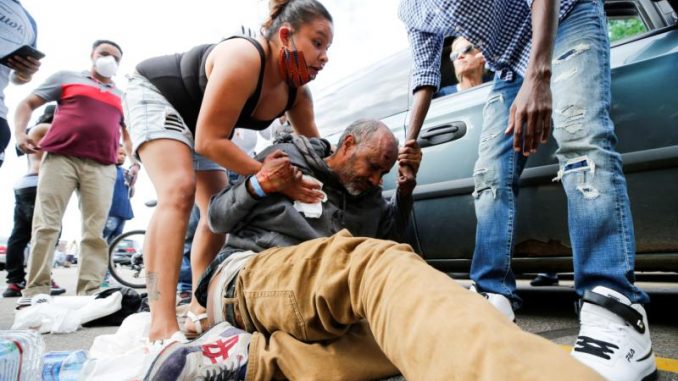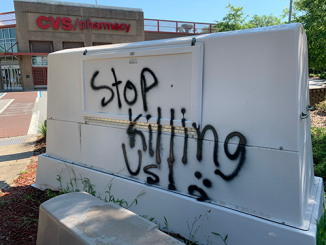
ST. PAUL, Minn.—A video showing a Minneapolis police officer kneeling on the neck of a handcuffed man repeatedly saying “I can’t breathe,” and who appears to lose consciousness or die while being pinned down, is “gut wrenching and deeply disturbing,” Archbishop Bernard A. Hebda of St. Paul and Minneapolis said in a May 27 statement.
“The sadness and pain are intense,” Archbishop Hebda said of the circumstances surrounding the May 25 death of George Floyd. “Let us pray for comfort for his grieving family and friends, peace for a hurting community and prudence while the process moves forward. We need a full investigation that results in rightful accountability and veritable justice.”
A bystander filmed part of police’s confrontation with the 46-year-old Floyd, an African American restaurant worker from St. Louis Park, Minnesota. who was reportedly arrested on suspicion of forgery. Floyd was pronounced dead at Hennepin County Medical Center. The four officers involved Floyd’s arrest have been fired, and the FBI is conducting a federal civil rights investigation. The officer who pinned Floyd is white.
The death inspired hundreds of people to protest May 26 at the intersection where police officers subdued Floyd. Some protesters vandalized police vehicles and the building for the Minneapolis Police Third Precinct building, where it is believed the officers involved worked. Police employed tear gas and flash grenades to disperse the crowd, and some protesters hurled rocks and water bottles at police.
Minneapolis Mayor Jacob Frey called May 27 for charges to be brought against the officer who pinned Floyd with his knee.
Violent protests and looting continued the night of May 27 and led to the shooting death of a man. Frey called for calm, saying, “We cannot let tragedy beget more tragedy.” He has asked the National Guard to come in to help keep the peace.
In his statement, Archbishop Hebda called for respect for all people and asked for prayers for Floyd and his family.
“Particularly at this time when human fragility has been brought into focus by the COVID-19 pandemic, we are called to respect the worth and dignity of each individual, whether they be civilians in need of protection or law enforcement officers charged with providing that protection,” he said.
“All human life is sacred,” he said. “Please join our Catholic community in praying for George Floyd and his family, and working for that day when ‘love and truth will meet (and) justice and peace will kiss’ (Psalm 85).”
Archbishop Hebda also posted on Twitter May 27 that he offered Mass that morning for Floyd and his family. “In these days before Pentecost, we pray that the Holy Spirit, the Breath of God, might help ease our collective pain, promote justice, and bring about greater respect for all human life.”
In a video message posted May 27, the pastor of St. Paul’s historically black Catholic parish called on his parishioners “to agitate” their community, Church and world for racial justice and healing.
Father Erich Rutten, pastor of St. Peter Claver in St. Paul, shared his vision for his parish following Floyd’s death.
And while Father Rutten said he doesn’t know all the details of the situation, the video posted online, now well circulated, showing a white police officer kneeling on Floyd’s neck while Floyd, who is handcuffed, repeatedly said he couldn’t breathe, “seems so egregious.”
“I am saddened. I am sickened. I am angered. And I am tired of such things happening again and again,” Father Rutten said. “How long, O Lord, must we endure such things?”
Some people think white supremacy is a concept for university or talk radio debate, he said, but “here is a case where white supremacy has cost someone their life.”
“The misguided idea that white people can somehow push people around, or that we own this country, or that we own Minneapolis leads to terrible disrespect, leads to poverty, leads to, in this case, violence, and in many cases, violence,” said Father Rutten, who is white.
In contrast, God’s love, as revealed by Jesus, shows people that they are all children of one God, equally subject to Christ the King, he said. “We are all brothers and sisters.”
In other reaction, the General Council of the Dominican Sisters of Adrian, Michigan, said Floyd’s “anguished cry, ‘I can’t breathe,’ as an officer pressed his knee into his neck, harkened back to the cries six years ago of Eric Garner, another unarmed African American man who died in New York police custody.”
Floyd’s cry “brings to mind the long and growing list of African Americans who have been killed, seemingly for no reason other than being black,” the women religious said, and quoted Mayor Frey: “Being black in America should not be a death sentence.”
The Dominicans said they were “deeply troubled and distressed by the violent assault” on Floyd, resulting in his death.
“Our Christian faith tradition holds that we are all one people, one body; each made in the image of God,” their statement said.
The Dominicans referenced a videotaped sermon by the Rev. Otis Moss III, a prominent Chicago pastor, addressing another recent fatal shooting, that of a 25-year-old black man, for Ahmaud Arbery, in Georgia. Three white men are in custody and face a hearing on murder charges.
In the sermon, titled “The Cross and the Lynching Tree: A Requiem for Ahmaud Arbery,” Rev. Moss “speaks of racism as a virus that has infected the spirit and soul of our country,” the Dominicans said.
He said Arbery’s death “is not an anomaly but a historical pattern of behavior that binds every American to an unexamined history of our nation.”
“Rev. Moss powerfully summarizes that unexamined history in his 22-minute sermon. It is a history that we Americans must acknowledge — and then set ourselves on a soul-searching course, powered by courage and love, to make real the ideals of freedom and equality on which our nation was founded,” the women religious said.
Signing the statement were Dominican Sisters Patricia Siemen, prioress; Frances Nadolny, administrator and general councilor; Mary Margaret Pachucki, vicaress and general councilor; and Patricia Harvat and Elise D. Garcia, general councilors.
By Maria Wiering, editor of The Catholic Spirit, newspaper of the Archdiocese of St. Paul and Minneapolis.

